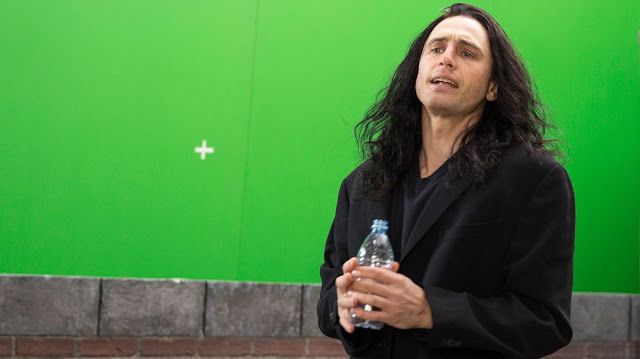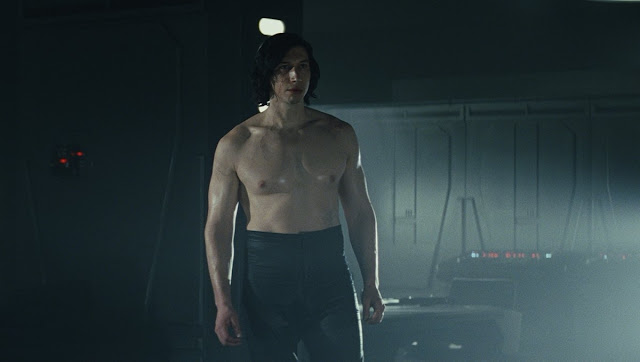Top Ten of 2017
Here are my ten favorite films of 2017 (and some honorable mentions). The key word is “favorite.” I’m not saying these are the best films of the year, whatever that means, anyway. I’m not qualified to judge films based solely on how technically good they are (I’m not sure anyone is). I can only tell you which films I liked the most last year. So here goes.
1. Blade Runner 2049
When I first read about this project, I was very skeptical.
I just didn’t see Blade Runner as a
franchise. Then Denis Villeneuve (Arrival,
Sicario, Prisoners) came on board, and things changed. He did not
disappoint. Rather than take a moody sci-fi noir and turn it into a cash grab
summer action movie, Villeneuve made a nearly three hour film that’s even
moodier and more contemplative than the original. Looking back at the original Blade Runner, I always think, “You
couldn’t make a film like this today.” It’s too slow and too expensive for a
studio to put money behind it. I was wrong...and right. Villeneuve did make a
film like the original Blade Runner
in spirit, but since it cost so much and it made so little, this will probably
never happen again. I’m thankful it happened once, at least. Villeneuve was
given the money and freedom to build a world I couldn’t get enough of. They
nailed the look (cinematographer Roger Deakins should win the Oscar), the feel,
and the sound (Hans Zimmer should have been nominated for this instead of Dunkirk) of the original, and, in my
opinion, improved upon it. The cast was great, and the story was a satisfying
and logical continuation of the first film. This is a nearly three hour long
moody, dystopian sci-fi film with very little dialogue and even less action,
and I wish it was longer. I can’t think of anything I did not like about this
movie. How could it not be my favorite film of the year?
2. The
Killing of a Sacred Deer
If you follow my writing or my yearly top ten, then you know
I like my movies weird, and boy oh boy, is this one weird. Every year there’s
movie I love but won’t recommend (to most people). This year, that honor goes
to The Killing of a Sacred Deer.
Writer/director Yorgos Lanthimos (his previous film was The Lobster, my favorite film of 2015) has developed this style of
having his characters do or say outrageous things while acting like robots. I
don’t know why, but I find it hilarious. I guess it’s the absurdity of the
performances and the plots of his films. It also helps that his films are
reminiscent of Stanley Kubrick stylistically. The guy is the total weird
package. I know that I’ve written nothing specific about this movie in this
paragraph about this movie, but I would rather leave it at this: if you liked The Lobster, you’ll like this. If you
skipped The Lobster, you should
probably skip this one too.
3. Logan
Wolverine has always been one of my favorite comic book
characters, and Hugh Jackman has been great all these years. But he never got
to truly be Wolverine...until Logan.
Being able to see Wolverine rip through people in R-rated glory was a highlight
of my movie year. It was like taking all of the implied gory action from all
the previous films and letting it all explode in one film. Once I got over the
high of the violence, I realized that director/co-writer James Mangold made the
most poignant comic book movie ever. I think we all hold comic book movies in
high regard these days, but Logan is
unique in its brutality, its heart, and its finality. Perhaps the most
refreshing part about the film is the fact that it isn’t a direct sequel nor is
it setting up a dozen other movies. Logan
truly stands on its own.
4. mother!
Writer/director Darren Aronofsky is one of my favorite
filmmakers, so when mother! was
released to a very divisive response, I knew I would end up loving it. When a
movie divides people, it’s almost always a sign that it is at the very least
interesting and unique, and mother!
is certainly both of those. I enjoyed it for the style alone (the early
claustrophobic camerawork and the amazing chaos near the end of the film), but
the performances and its allegorical nature made it one of my favorite films.
Allegorical films are just more engaging to watch than most films. I spent the
entire film wondering, “What does this represent?” You can do this with any
movie (whether the movie is attempting to represent something or not), but when
the film is intentionally allegorical, it’s like solving a film puzzle. That
mind sound terrible to some, but that makes the viewing process much more enjoyable
to me.
5. The Lost
City of Z
An ambitious movie about ambition. I was excited to see this
since I read the book, and I was pleasantly surprised to end up enjoying this
more than the source material. Those looking for answers about the titular lost
city in the Amazon will likely come away a bit disappointed, but this film is
about much more than the city. It’s about ambition, sacrifice, family,
obsession, exploration, and racism. It’s ambitious enough that so many themes
are evaluated in the film, but to top that writer/director James Gray decided
to actually film in the jungle. It also features Charlie Hunnam’s best
performance by far. Robert Pattinson is great in it, as well (this film along
with Good Time have definitely
changed my opinion about the Twilight
star). I’ve watched the film twice now and liked it even more the second time.
Perhaps if I were to watch it a few more times it would climb higher on my
list. I do think this film more than most this year will be looked at later on
as an underseen and underappreciated masterwork.
6. Phantom
Thread
It’s a safe bet that if Paul Thomas Anderson releases a
movie it will end up on my top ten list. I was initially worried about Phantom Thread because of the, well,
boring subject matter: a dressmaker in the 1950s has his controlled life thrown
into disarray when he begins a new relationship. Only Anderson could not only
get me to watch a movie with this plot, but also make me love it. Of course,
Daniel Day-Lewis’s involvement made it an easy film to love, also. The film
isn’t about dressmaking, really, but about the creative process, in general,
and the dynamics of power in relationships. This is another movie that makes
you study every moment and every sound. It’s also very funny, which I imagine
many people would not expect. Paul Thomas Anderson continues to prove that you
can have arthouse goals with a film while also genuinely entertaining the
audience.
7. Hostiles
Westerns are few and far between these days, so it’s
important that the few that get made are of high quality. Thankfully, that’s
the case with Hostiles, a bleak and
violent film about the complexities of the treatment of Native Americans in the
late 1800s. The cast is amazing, as well, with Christian Bale standing out, as
usual. It’s a bit quieter performance for him, but no less impressive than his
more famous roles.
8. The
Disaster Artist
I loved this movie, but it’s difficult to judge whether this
is really a good movie on its own. The
Disaster Artist is about the making of the notoriously terrible movie The Room. I’ve seen The Room multiple times, so every joke and performance (especially
James Franco’s shockingly good impression of filmmaker Tommy Wiseau) made sense
to me. If I had no knowledge of The Room
beforehand, I’m not sure I would have loved this movie so much. I think I would
have liked it, but it probably wouldn’t have made my top ten. But I do know
what The Room is, so The Disaster Artist is one of my
favorite films of the year.
9. Three
Billboards Outside Ebbing, Missouri
Writer/director Martin McDonagh made one of my favorite
comedies of the last ten years with In
Bruges, a film that showcased his ability to write sharp, often acidic
dialogue. So who better to deliver that type of dialogue than Frances
McDormand? This is her movie, but the supporting performances from Sam Rockwell
and Woody Harrelson are great, too. More than performances, the complexity of
this angry, shocking, and funny film make it one of the year’s best. The film
has faced a bit of backlash because (SPOILERS) a racist character redeems
himself a bit at the end a bit too easily. I don’t see a problem with a
despicable character also doing something good. That just shows complexity and
realism. It makes no sense that a film should be attacked for presenting
something that happens in the real world every day, because, unfortunately,
people can be terrible and do good things from time to time too. Most of us are
not all good or all bad, and neither are the characters in McDonagh’s films,
and that’s a good thing.
10. I Don’t
Feel at Home in This World Anymore.
The ten-spot is always up in the air for me, and I changed
my mind about a dozen times before going with this truly surprising film from
writer/(first time)director Macon Blair. The story is pretty basic (a woman’s
house is robbed, and the cops don’t seem too concerned, so she takes matters in
her own hands), but the themes concerning justice, being a good person, and
fitting in in society make this film interesting. What put it over the edge for
me was the surprising and funny violence throughout. Also Melanie Lynskey is
always good, and Elijah Wood was great as a dorky weirdo.
I’ll finish up with my honorable mentions. Most of these
could have easily been my tenth pick, but for whatever reason didn’t make the
cut. Still, I liked and/or appreciated all of these movies.
Honorable Mentions:
The Shape of Water
- An R-rated fairy tale from Guillermo del Toro; that’s enough for me.
IT - This one made
my list because I assumed I would hate it, but I ended up really enjoying it.
Molly’s Game -
Aaron Sorkin’s script is getting the attention, but this is Jessica Chastain’s
film.
I, Tonya - I
really liked the faux-documentary/4th wall-breaking style about this crazy
moment from the 90s.
Baby Driver - Some
of the best chase sequences ever, but it makes my list for the Michael Myers
mask joke alone.
T2 Trainspotting -
A film that pretty much makes a case against its own existence and nostalgia in
general; a rare sequel that has something to say.
John Wick: Chapter 2
- A rare sequel that is nearly as awesome as the original.
Alien: Covenant -
Double Michael Fassbender made this prequel/quasi re-make stand out.
War for the Planet of
the Apes - A fitting end to one of the most surprisingly good trilogies
ever.
The Post - You
can’t go wrong with Spielberg, Streep, and Hanks.
Logan Lucky - Excellent
heist film, but it mainly made my list because of the Game of Thrones joke in the prison.
Dunkirk - This is
the one I appreciated more than liked; the use of tension is masterful.













